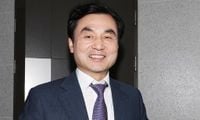On June 23, President Lee Jae-myung unveiled a landmark cabinet lineup, nominating 11 ministerial candidates including the historic appointment of Ahn Gyu-baek as Minister of National Defense. If confirmed, Ahn would become South Korea's first purely civilian defense minister in 64 years, breaking a long-standing tradition of military generals occupying the post since the 1961 May 16 military coup.
Ahn Gyu-baek, a five-term lawmaker from the Democratic Party, has built a distinguished career centered on national defense. Born in April 1961 in Gochang, Jeollabuk-do, he graduated from Gwangju Seosuk High School and earned a degree in Philosophy from Sungkyunkwan University. His military service was as a regular soldier in the Army’s 35th Infantry Division, performing military police duties from 1983 to 1985 before being discharged as a private first class.
Entering politics in 1987 as a public appointee for former President Kim Dae-jung’s Peace Democratic Party, Ahn transitioned from journalism to political leadership roles, including serving as head of the Democratic Party’s policy committee public relations. He was first elected to the National Assembly in 2008 via proportional representation and has since won five consecutive terms representing Seoul’s Dongdaemun-gap district.
Throughout his legislative career, Ahn has been deeply embedded in defense matters, spending nearly 17 years on the National Assembly Defense Committee—an unusual level of specialization given that many lawmakers rotate committees every two years. He served as the committee’s executive secretary during the 19th National Assembly and as chairman in the 20th, earning the rare reputation of a civilian 'defense expert.' His work included advocating for improved treatment of military personnel and supporting legislation to bolster South Korea’s defense industry.
President Lee’s decision to nominate Ahn aligns with his campaign promise to gradually expand civilian control over defense institutions, including the Ministry of National Defense and the Defense Acquisition Program Administration. This move addresses longstanding criticisms that military generals who have traditionally held the defense minister position often prioritize military interests over civilian oversight. Since the May 16 coup, all 39 defense ministers have been military officers, predominantly from the Army, with 32 out of 33 Army ministers holding senior ranks of colonel or general.
The call for a civilian defense minister intensified following the December 3, 2024, internal military unrest, when then-Defense Minister Kim Yong-hyun, an Army lieutenant general, was accused of favoring military peers over civilian authority. Previous administrations, including those of Roh Moo-hyun and Moon Jae-in, attempted to appoint civilian defense ministers but ultimately retreated due to escalating nuclear threats from North Korea.
Alongside Ahn, President Lee nominated Jo Hyun as Minister of Foreign Affairs. Jo is a seasoned diplomat who passed the 13th Foreign Service Examination and joined the Ministry of Foreign Affairs in 1979. His career includes ambassadorships to Austria and the United Nations, as well as serving as both the 1st and 2nd Vice Minister of Foreign Affairs. Known for his expertise in multilateral and trade diplomacy, Jo is expected to leverage his extensive experience to navigate complex international relations.
Jeong Dong-young, a five-term Democratic Party lawmaker and former Minister of Unification under the Roh Moo-hyun administration, was nominated as Minister of Unification. Jeong led the Gaeseong Industrial Complex project and engaged directly with North Korean leadership during his tenure, including a special envoy visit to meet Kim Jong-il. He played a key role in the 9.19 Joint Statement, which focused on North Korea’s denuclearization and return to the Nuclear Non-Proliferation Treaty (NPT). Jeong expressed on social media his "heavy responsibility" and intention to serve as a "peace special envoy for the Korean Peninsula" if appointed.
The cabinet lineup also includes Kwon Oh-eul, a three-term conservative politician from Andong, Gyeongbuk, nominated as Minister of Patriots and Veterans Affairs. Kwon, who initially entered politics as a member of the United Democratic Party, later aligned with conservative parties following political realignments. His appointment reflects President Lee’s pragmatic approach to governance, seeking to bridge political divides.
Other notable nominees include Bae Kyung-hoon, head of LG AI Research Institute, as Minister of Science, Technology, Information and Communication. Bae, an AI scholar and entrepreneur, is tasked with advancing South Korea’s goal to become a leading AI power globally. Han Seong-sook, former CEO of Naver and a recognized innovator, was nominated as Minister of SMEs and Startups, bringing her experience in digital platforms like Naver Webtoon to government innovation efforts.
Kim Young-hoon, former chairman of the Federation of Korean Trade Unions and the Korean Railway Workers' Union, was nominated as Minister of Employment and Labor. He is expected to champion labor rights reforms, including reducing industrial accidents, revising the Yellow Envelope Act, and promoting a 4.5-day workweek. Other Democratic Party lawmakers nominated include Kim Seong-hwan for Environment, Kang Seon-woo for Gender Equality and Family, and Jeon Jae-soo for Oceans and Fisheries.
President Lee’s administration also retained Song Mi-ryeong as Minister of Agriculture, Food and Rural Affairs, a decision praised for its practical, performance-based approach that transcends political affiliations. Yoon Chang-ryeol, former LG Global Strategy Development head and experienced government policy coordinator, was appointed as Minister of Government Policy Coordination.
Presidential Chief of Staff Kang Hoon-sik emphasized the administration’s commitment to pragmatism and swift action, noting that the confirmation hearings should proceed rapidly to enable the new cabinet to effectively respond to escalating global challenges, including the Middle East conflict and its economic repercussions. Kang also indicated that nominations for key economic ministries and education are forthcoming.
This diverse and experienced cabinet reflects President Lee’s vision of inclusive governance that balances expertise, political experience, and innovation. The historic appointment of a civilian defense minister marks a significant shift in South Korea’s civil-military relations, signaling a renewed commitment to civilian oversight and democratic control of the armed forces.

![국방장관 민간 출신, 노동장관 민노총 출신, 과기장관 LG 출신 [11개 부처 인선]](https://thumbor.evrimagaci.org/2YKQnoAqGeDnkTEuLmDMvmPK5dk=/200x0/tpg%2Fsources%2Ffe472fd6-5879-4c54-a177-dc41110e6928.jpeg)



